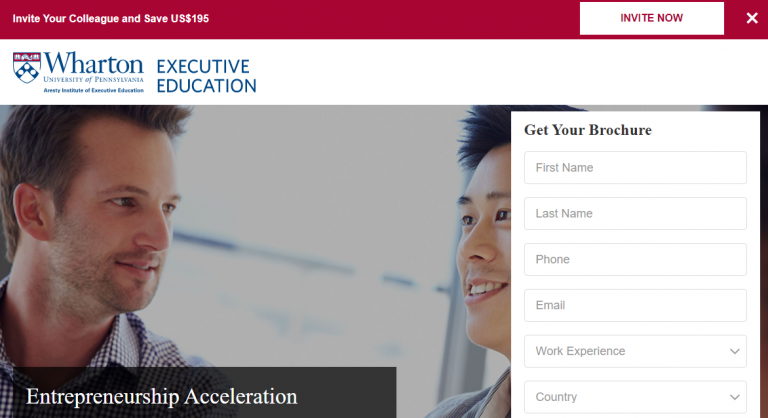Entrepreneurship Acceleration Program - Wharton School of the University of Pennsylvania
Why Enroll in Wharton’s Entrepreneurship Acceleration Program?
There’s no shortage of pitfalls for startups and their founders. The 90 percent failure rate of startups is enough to make you think about keeping your day job — forever. But what if there was a proven playbook that dramatically increased the odds of success?
Being successful in venture capital means having a mix of cross-disciplinary skills, which is why expert faculty for this program stem from social psychology, organizational behavior, information technology, finance, and marketing.
The Formula to Accelerate Your Business
Enroll in this program and dramatically increase the odds of success by learning how to:
- Pick the right business model
- There are many different types of business models. Survey the range of options, including the disruptive model, the architecture model, the value chain model, and the efficiency model, with examples of each type. Utilize the Business Model Canvas tool to help you decide on your model.
- Build the right team
- Learn about the Three Rs of founding teams — relationships, roles, and rewards — and the three critical questions entrepreneurs must address when setting up their company. Topics include allocating equity, founder’s agreements, hiring key management, and finding technical resources.
- Choose the right financing approach
- Raising funds to scale is one of the biggest challenges that startups face. Learn about the various financing pathways available and the tradeoffs for each type. Topics include equity financing valuations, equity financing terms, and term sheets.
- Ramp up sales and scale the business
- In order to drive sales, you need a foundational understanding of your potential customers and markets. Considerations such as the rate of adoption of new products help with demand forecasting. Understand the importance of creating a growth culture and different expansion strategies, such as vertical and horizontal expansion.
Program Topics
Module 1: Evidence-Based Entrepreneurship
Learn how to apply the "lean approach": transform a good idea into a successful business venture while minimizing risk
Module 2: Building the Right Team
Learn how to select founding members, employees, managers, and other key players on your team
Module 3: Lawyers, Advisors, and Mentors
Learn how to use innovation and networking to drive your enterprise forward
Module 4: Business Models and Customer Lifetime Value
Learn how to choose the right business model for your venture
Module 5: Customer Acquisition and Demand Generation
Learn how to find markets and create demand for your product
Module 6: Pricing and Distribution Strategies
Learn how to apply cost structures and pricing mechanisms to your business and use performance measurement tools effectively
Module 7: Gearing Up for Scale
Learn to recruit people who will build your company’s culture and use it to scale up your venture
Module 8: Financing: Funding and Valuation
Learn the various sources of financing available for your business
Module 9: Financing: Venture Capital vs. Alternative Funding Channels
Learn how to make a wise decision about venture capital or alternative funding and how to estimate a breakeven point
Module 10: Elements of the Pitch
Create executive summaries and pitch decks for your business and understand how the exit of founding shareholders affects liquidity
Module 11: Business Plan Competition
Participate in a business plan competition with your peers and create a pitch for your own venture. The winner of the competition and the runner-up will win a substantial cash prize to use for seed funding (rules and restrictions apply).
Business Plan Competition
Participate in a business plan competition with your peers in which you will create a pitch for your own venture. The winner of the competition and the runner-up will win a substantial cash prize to use for seed funding (rules and restrictions apply).
The judging criteria are focused on the customer value proposition, which includes size of market, competitive landscape, and clear differentiation; economic model of the venture; go-to-market plan; and the capabilities and background of the team.
Members of the Wharton entrepreneurship community, with support from program leaders, will review the plans submitted for consideration and will select the top seven business plans as semi-finalists.
Article from: https://online-execed.wharton.upenn.edu/entrepreneurship

